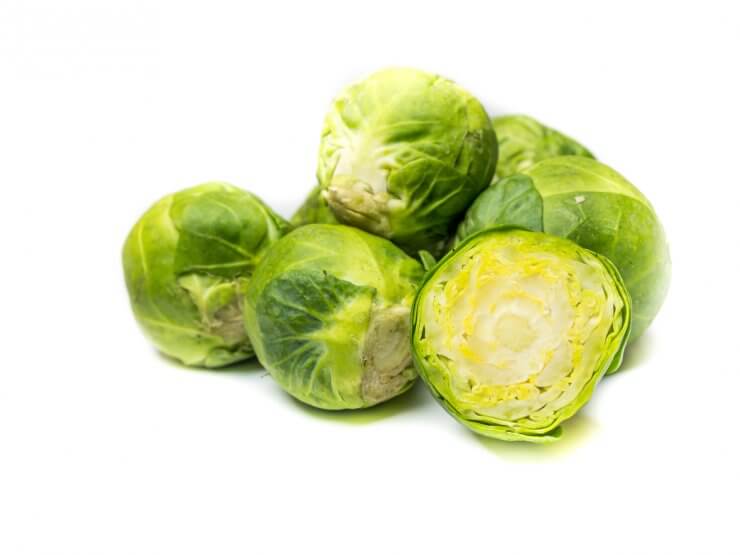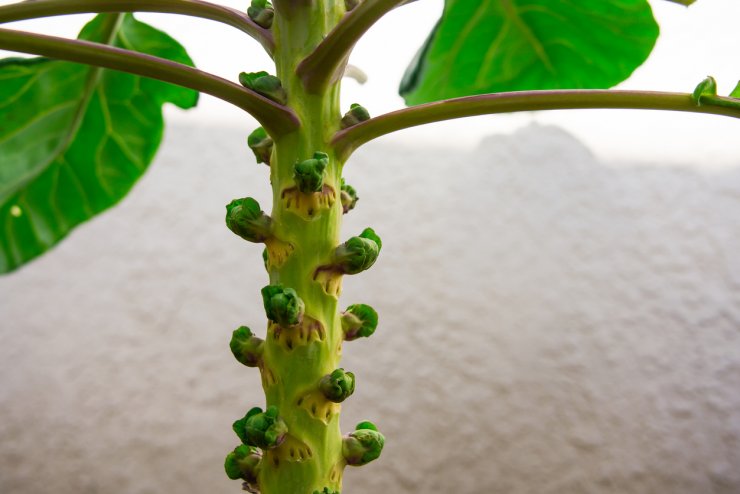
Healthy Brussels sprouts, ready to cook
Blossom-end rot (BER) is more common among plants that produce fruit on the vine—squash, tomatoes, peppers—than it is with Brussels sprouts. That being said, BER can affect your sprouts. The stems and leaves will show no symptoms, and you’ll have to look closely to identify this problem.
What does blossom-end rot (BER) look like?
The internal leaves of the Brussels sprout will turn brown. Gardeners may not notice BER in Brussels sprouts until the first sprouts have ripened.
What causes BER?
Calcium imbalance in the Brussels sprout causes BER. Brussels sprout cells need calcium to grow, and calcium binds the Brussels sprout cells together. When a plant lacks complete calcium absorption, BER can develop.
Other conditions can hasten the development of BER, such as:
- inconsistent watering
- root damage
- cold temperatures/cold soil
- excessive heat
- too much nitrogen in soil (which lowers the plant’s calcium intake)
- large amount of salts in the soil (lowers the availability of calcium)
- markedly acidic or alkaline soil (pH imbalance prevents calcium absorption)
Keep in mind that Brussels sprouts are heavy feeders and they like a lot of nitrogen in the soil. But too much of a good thing can cause serious damage to your crop. This is why it’s so important to test your soil.
When does blossom-end rot affect Brussels sprout plants?
Different conditions allow Brussels sprouts to develop BER:
- When Brussels sprouts are maturing and they need calcium to bind together cells
- When watering is inconsistent or lacking
- When temperatures are excessive—both too hot and too cold weather can interfere with water flow
- When plants are grown in cold, heavy soil, which prevents strong root development
- When soil has excessive salts, which reduces calcium availability
How can you control and treat BER?
Blossom-end rot cannot be reversed on a Brussels sprout once it’s set in, but you can take these steps to slow BER or stop it:
- Preserve affected plants by applying calcium immediately. You can use products specifically developed to treat, prevent, and slow blossom-end rot in Brussels sprouts. Or you can mix 1 tablespoon calcium chloride (sold commercially for other uses as de-icing salt) in 1 gallon of water. Spray two to three times a week until blossom-end rot is under control. Apply early in the morning when temperatures are cooler.
- Pick affected sprouts to reduce stress on the plant and allow it to direct its energy to other, healthier sprouts.
- Peel the leaves off the sprouts until you get past the brow leaves; eat the remaining good part. Blossom-end rot does not make the rest of the Brussels sprout inedible. However, if Brussels sprouts have been infected by fungi or mold, discard them immediately.
How can you prevent blossom-end rot?

Planting Brussels sprouts too early can expose plants to BER later.
There are lots of ways you can take measures to prevent BER in the first place:
- Plant in an area with good drainage.
- Avoid planting too early in the season, which can expose plants to cooler temperatures and cold soil. Allow soil outside to warm up before planting.
- Work plenty of compost and organic matter into your soil before planting so that the plant’s root system has a better chance to grow strong and deep.
- Add quick-release lime when planting Brussels sprouts, so there’s plenty of calcium in the soil and it gets quickly absorbed. Brussels sprouts grow best when the soil pH is about 6.5.
- Keep the water supply for your Brussels sprout plants even throughout the season so that calcium uptake is regular. Brussels sprouts need about 1 to 1 1/2 inches of water a week. The plants perform best when watered deeply a couple of times a week, rather than every day.
- Mulch plants once they are planted and have started growing to maintain moisture levels.
- Cultivate weeds carefully around Brussels sprout plants to avoid damaging root systems. Don’t dig more than an inch or two deep around plants.
Do your Brussels sprout plants suffer rot? Do you have any great tips about how to avoid Brussels sprout rot? Please tell us how you deal with Brussels sprout rot in your garden.


 Previous
Previous

